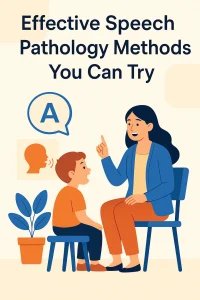Enhance Your Communication: How Adult Speech Therapy Can Help
Last Updated: June 28, 2024
When you think of speech therapy, you might picture a child learning to pronounce words correctly or overcoming a stutter. However, speech therapy isn’t just for children. Adults can also benefit significantly from this specialized support. Adult speech therapy addresses a wide range of communication challenges that can arise due to various factors such as neurological conditions, injuries, or even long-standing speech difficulties. This therapy aims to enhance an adult’s ability to communicate clearly and effectively, ultimately improving their quality of life.
Book an Free Online Speech Consultation
Understanding Adult Speech Therapy
Definition and Scope of Adult Speech Therapy
Adult speech therapy is a specialized form of therapy designed to address and manage speech, language, and communication disorders in adults. This type of therapy is conducted by speech-language pathologists who are trained to diagnose and treat a wide range of communication issues. The scope of adult speech therapy includes working on speech production, language comprehension and expression, voice quality, fluency, and cognitive-communication skills.
Primary Goals of Speech Therapy for Adults
The primary goals of adult speech therapy are tailored to meet the specific needs of each individual. Here are some key objectives:
- Improve Speech Clarity: This involves working on articulation and phonation to ensure that speech sounds are produced clearly and correctly. This is crucial for individuals with articulation disorders or those who need accent modification.
- Enhance Language Skills: For adults who struggle with language comprehension and expression, speech therapy focuses on improving vocabulary, sentence structure, and overall language proficiency. This is especially beneficial for those with language disorders or after neurological events like a stroke.
- Boost Fluency: For individuals who stutter, therapy aims to reduce disfluencies and manage stuttering more effectively. Techniques such as slow speech, controlled breathing, and other fluency-enhancing strategies are commonly used.
- Improve Voice Quality: Voice therapy helps individuals with voice disorders achieve a healthier and more functional voice. This can include working on pitch, volume, and vocal endurance, which is essential for professions that rely heavily on vocal communication.
- Develop Pragmatic Skills: For those on the autism spectrum or with social communication difficulties, therapy includes improving pragmatic language skills—understanding and using appropriate communication in various social contexts.
- Address Cognitive-Communication Issues: Adults who have experienced traumatic brain injuries or neurodegenerative diseases may face cognitive-communication challenges. Therapy in this area focuses on enhancing memory, problem-solving, and organizational skills to support better overall communication.
- Support Swallowing and Feeding: For individuals with dysphagia or swallowing disorders, speech therapists provide strategies and exercises to ensure safe and efficient swallowing, improving nutrition and overall health.
Discover more: how to improve your articulation and overall speech clarity
Common Reasons Adults Seek Speech Therapy
Accent Modification
Many adults seek speech therapy to modify their accent. Accents are unique to individuals, shaped by their native language and cultural background. However, sometimes an accent can make it difficult to be understood, leading to communication breakdowns.
- Improving Clarity When Speaking: Speech therapy helps individuals modify their accent to improve speech clarity. This involves working on pronunciation, intonation, and rhythm to make speech more comprehensible.
- Reducing Frustration and Increasing Confidence: Struggling to be understood can be frustrating and can lower self-confidence. By enhancing clarity, speech therapy reduces this frustration and boosts confidence in communication.
- Benefits in Professional and Social Settings: Clearer speech can have significant benefits in both professional and social settings. It can enhance job performance, facilitate better interactions with colleagues and clients, and improve social relationships.
Know more: Speak Clearly & Be Understood: Easy Accent Reduction Tips
Autism Spectrum Disorder
Autistic adults often benefit from speech therapy to improve their social communication skills.
- Addressing Pragmatic Language Skills: Therapy helps in using language appropriately in various social situations, which is crucial for effective communication.
- Enhancing Social Interaction and Communication: Improving pragmatic language skills enhances an individual’s ability to interact socially, making conversations more meaningful and engaging.
- Importance of Therapy for Autistic Adults: Speech therapy is vital for autistic adults as it helps them navigate social interactions more effectively, leading to better personal and professional relationships.
Read more: Autism and Stuttering: Strategies for Effective Communication
Articulation Disorders
Articulation disorders involve difficulties in producing specific speech sounds correctly.
- Correcting Speech Sound Errors: Speech therapy addresses common articulation errors, such as lisping or difficulty pronouncing sounds like “TH” or “R”.
- Improving Overall Speech Clarity: By correcting these errors, therapy improves overall speech clarity, making communication smoother and more effective.
Fluency/Stuttering
Stuttering can significantly impact an adult’s ability to communicate.
- Managing Stuttering and Improving Speech Flow: Speech therapy provides strategies to manage stuttering, helping individuals speak more fluently.
- Reducing Anxiety and Enhancing Communication Confidence: By improving speech flow, therapy reduces anxiety associated with speaking and boosts confidence, making social and professional interactions more comfortable.
Read More: 7 Key Techniques for Overcoming Stuttering
Parkinson’s Disease
Parkinson’s disease can affect speech clarity and voice quality.
- Improving Vocal Quality and Articulation: Speech therapy helps improve vocal quality and articulation, addressing issues like soft, monotone, or breathy speech.
- Addressing Speech Issues Associated with Neurological Conditions: Therapy is crucial for managing speech issues that arise due to Parkinson’s, helping individuals maintain effective communication.
Know more: Effective Interventions for Adult Communication Disorders
Voice Disorders
Voice disorders can affect anyone but are particularly common among professionals who use their voice extensively.
- Addressing Hoarseness, Vocal Fatigue, and Inappropriate Pitch: Speech therapy helps treat voice disorders by improving vocal health and addressing issues like hoarseness, vocal fatigue, and inappropriate pitch.
- Importance for Professionals like Teachers and Singers: For teachers, singers, and other professionals who rely on their voice, maintaining vocal health is crucial. Speech therapy provides strategies to protect and enhance their vocal abilities.
Public Speaking
Many adults experience anxiety about speaking in public, which can hinder their ability to communicate effectively.
- Overcoming Stage Fright: Speech therapy helps individuals overcome stage fright by teaching techniques to manage anxiety and improve speech delivery.
- Enhancing Public Speaking Skills and Confidence: Through therapy, individuals can develop the skills needed for effective public speaking, boosting their confidence and ability to engage with audiences.
Common Reasons Adults Seek Speech Therapy
| Reason | Description |
|---|---|
| Accent Modification | Many adults seek to modify their accent to improve speech clarity. This reduces frustration and boosts confidence in both professional and social settings. |
| Autism Spectrum Disorder | Enhancing pragmatic language skills, social interaction, and communication is vital for autistic adults. Therapy focuses on appropriate social communication. |
| Articulation Disorders | Correcting speech sound errors, such as lisping, helps improve overall speech clarity. Therapy involves exercises to articulate sounds correctly. |
| Fluency/Stuttering | Managing stuttering involves techniques to improve speech flow, reduce anxiety, and enhance communication confidence, making interactions smoother and easier. |
| Parkinson’s Disease | Therapy for Parkinson’s disease focuses on improving vocal quality and addressing speech issues associated with this neurological condition. |
| Voice Disorders | Treating hoarseness, vocal fatigue, and inappropriate pitch is crucial, especially for professionals like teachers and singers who rely heavily on their voice. |
| Public Speaking | Overcoming stage fright and enhancing public speaking skills and confidence is a common reason adults seek speech therapy. Techniques focus on articulation and stress management. |
Benefits of Adult Speech Therapy
Improved Communication Skills
One of the most significant benefits of adult speech therapy is the improvement in communication skills. Enhancing speech clarity and fluency is crucial for effective interaction. Through targeted exercises and techniques, speech therapy helps individuals articulate words more clearly and manage fluency issues such as stuttering.
- Enhancing Speech Clarity and Fluency: Clear and fluent speech makes conversations smoother and more understandable, reducing the frustration of communication breakdowns.
- Benefits for Personal and Professional Interactions: Improved communication skills positively impact personal relationships and professional interactions. Being able to express oneself clearly boosts confidence in social settings and enhances professional credibility and effectiveness.
Increased Confidence and Self-Esteem
With improved communication skills comes increased confidence and self-esteem. Being able to speak clearly and be understood has a profound effect on how individuals perceive themselves and interact with the world.
- Positive Impact on Social Life and Career: Enhanced communication leads to better social interactions, making it easier to build and maintain relationships. In the workplace, clear communication can lead to better job performance and opportunities for advancement.
- Examples of Real-Life Improvements: Many adults who have undergone speech therapy report feeling more confident in meetings, social gatherings, and public speaking situations. This boost in self-esteem can lead to a more fulfilling and successful life.
Enhanced Quality of Life
Overcoming communication barriers significantly enhances the quality of life. Being able to communicate effectively promotes independence and well-being.
- Overcoming Communication Barriers: Speech therapy provides the tools and strategies needed to overcome various communication challenges, making everyday interactions less stressful and more enjoyable.
- Promoting Independence and Well-Being: Effective communication is key to participating fully in social and professional life, fostering a sense of independence and contributing to overall well-being.
Adaptation and Compensation Strategies
Speech therapy equips individuals with techniques to manage communication challenges and utilize assistive technology and compensatory strategies effectively.
- Techniques for Managing Communication Challenges: Therapists teach strategies to cope with and manage specific communication issues, such as using visual aids or simplifying language for better understanding.
- Use of Assistive Technology and Compensatory Strategies: Assistive technologies like speech-generating devices or apps can support communication. Compensatory strategies, such as writing notes or using gestures, can also be beneficial.
Support in Professional Settings
Professional success often hinges on effective communication. Speech therapy can significantly enhance career prospects and job satisfaction by improving communication skills.
- Improving Articulation and Presentation Skills: Clear articulation and confident presentation skills are essential in many professions. Speech therapy helps individuals develop these skills, making them more effective communicators in the workplace.
- Enhancing Career Prospects and Job Satisfaction: Improved communication skills can lead to better job performance, increased opportunities for career advancement, and greater job satisfaction.
How to Find the Right Speech Therapist
Importance of Specialized Experience
Finding the right speech therapist is crucial for effective treatment. It’s important to seek out a therapist with specialized experience in adult speech therapy. Each communication disorder is unique, and a therapist who has experience with your specific issue will be better equipped to provide effective treatment.
- Expertise in Specific Disorders: Therapists with experience in treating conditions like stuttering, articulation disorders, or neurological conditions such as Parkinson’s disease can tailor their approach to meet your unique needs.
- Understanding Adult Challenges: Adult speech therapy requires a different approach compared to pediatric therapy. A therapist experienced with adults will understand the complexities of adult communication challenges, including the impact on professional and social interactions.
Factors to Consider When Choosing a Therapist
Selecting the right speech therapist involves considering several factors to ensure you receive the best care possible.
- Credentials and Certification: Ensure the therapist is certified by a recognized professional body, such as the American Speech-Language-Hearing Association (ASHA). Certification guarantees that the therapist has met the required standards of education and practice.
- Experience and Specialization: Look for a therapist with experience in adult speech therapy and specialization in your specific communication disorder. This information is often available on the therapist’s website or through direct inquiry.
- Therapist’s Approach and Techniques: Different therapists use various techniques and approaches. It’s essential to find a therapist whose methods align with your needs and preferences. Some might focus on cognitive-communication strategies, while others might emphasize practical exercises.
- Availability and Flexibility: Consider the therapist’s availability and whether they offer flexible scheduling options. This is particularly important for individuals with busy schedules or those who may need therapy sessions outside of regular working hours.
- Comfort and Rapport: Feeling comfortable with your therapist is crucial. A good therapist should be someone you can build a strong rapport with, as this relationship is vital for successful therapy outcomes.
Benefits of Online Speech Therapy and Telehealth
In recent years, online speech therapy and telehealth have become increasingly popular, offering several advantages.
- Convenience and Accessibility: Online therapy allows you to receive treatment from the comfort of your home, eliminating the need for travel. This is especially beneficial for those with mobility issues or living in remote areas.
- Flexible Scheduling: Telehealth offers more flexible scheduling options, making it easier to fit therapy sessions into your busy life. You can often choose times that work best for you, including evenings and weekends.
- Access to a Wider Range of Therapists: With online therapy, you are not limited to therapists in your local area. You can access specialized therapists from anywhere, ensuring you find the best match for your needs.
- Continuity of Care: Telehealth ensures that you can continue your therapy uninterrupted, even if you move to a different location or travel frequently.
Benefits of Online Speech Therapy
| Benefit | Description |
|---|---|
| Convenience | Receive therapy from the comfort of home, eliminating the need for travel and making it easier to attend sessions. |
| Flexible Scheduling | Easier to fit therapy sessions into busy schedules, including availability during evenings and weekends. |
| Access to Specialists | Ability to connect with specialized therapists regardless of geographic location, ensuring you get the best care. |
| Continuity of Care | Maintain consistent therapy sessions even when traveling or moving to a new location, ensuring ongoing progress. |
Conclusion
Don’t let communication struggles hold you back. Adult speech therapy can empower you to speak clearly and confidently. Improved fluency and clarity enhance communication with loved ones and colleagues. Therapy equips you with practical tools to manage communication challenges, boosting your self-esteem and social comfort. Take control and invest in clearer communication. Visit Wellness Hub for a personalized approach to regaining your voice.
Frequently Asked Questions:
1. What is adult speech therapy?
Adult speech therapy is a specialized treatment aimed at improving communication skills in adults. It addresses issues such as speech clarity, fluency, voice quality, and language comprehension. This therapy helps individuals overcome various communication challenges to enhance their personal and professional interactions.
2. Who can benefit from adult speech therapy?
Adults experiencing difficulties with speech clarity, stuttering, voice disorders, articulation problems, or social communication issues can benefit from speech therapy. It’s also helpful for those with neurological conditions like Parkinson’s disease or those seeking to modify their accent.
3. How does speech therapy improve communication skills?
Speech therapy improves communication skills through targeted exercises and techniques designed to enhance speech clarity, fluency, and voice quality. Therapists also teach strategies for better language comprehension and expression, making everyday interactions smoother and more effective.
4. What are the common reasons adults seek speech therapy?
Common reasons include accent modification, managing stuttering, addressing voice disorders, improving articulation, and enhancing social communication skills, especially for autistic adults. Therapy is also beneficial for those recovering from neurological conditions.
5. How long does adult speech therapy take to show results?
The duration of speech therapy varies depending on the individual’s specific needs, the severity of the communication issue, and the consistency of practice. Some may see improvements within a few weeks, while others might need several months of therapy for significant progress.
6. Can speech therapy help with public speaking anxiety?
Yes, speech therapy can help individuals overcome public speaking anxiety by teaching techniques to manage stress, improve speech delivery, and build confidence. This includes exercises for better articulation, vocal control, and effective body language.
7. What should I look for when choosing a speech therapist?
When choosing a speech therapist, consider their credentials, experience, and specialization in adult speech therapy. It’s also important to find a therapist whose approach aligns with your needs and with whom you feel comfortable.
8. Are there benefits to online speech therapy?
Online speech therapy offers several benefits, including convenience, flexible scheduling, and access to a broader range of therapists. It allows individuals to receive therapy from the comfort of their home, making it easier to fit sessions into a busy schedule.
9. How can I find a qualified speech therapist near me?
You can find a qualified speech therapist by researching online, asking for referrals from healthcare providers, or visiting platforms like Wellness Hub that connect you with experienced therapists. Ensure the therapist has the appropriate credentials and experience to address your specific needs.
10. Is speech therapy covered by insurance?
Coverage for speech therapy varies depending on your insurance plan. It’s best to check with your insurance provider to understand the specifics of your coverage, including any requirements for referrals or documentation.
About the Author:
Anuradha Karanam
Speech-language pathologist (7+ years of experience)
Anuradha Karanam is a skilled speech-language pathologist with over 6 years of experience. Fluent in Tamil, Telugu, Hindi, and English, she specializes in parent counseling, speech sound disorders, fluency assessment, and speech-language evaluations. Anuradha excels at working with children with developmental disorders, offering creative and effective therapy programs. Currently, at Wellness Hub, she holds a BASLP degree and is registered with the RCI (CRR No A85500). Her patience, ambition, and dedication make her a trusted expert in her field.
Book your Free Consultation Today
Parent/Caregiver Info:
Client’s Details:
* Error Message









